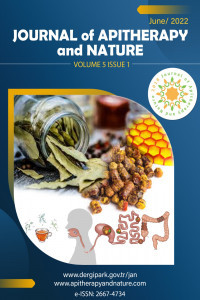Cytotoxic Activity of Four Propolis Colombian Samples Against Canine Osteosarcoma Cells
Cytotoxic Activity of Four Propolis Colombian Samples Against Canine Osteosarcoma Cells
Cytotoxic Activity, Propolis, canine osteosarcoma (OSA) cells,
___
- 1. Freires, I. A., de Alencar, S. M., & Rosalen, P. L. (2016). A pharmacological perspective on the use of Brazilian Red Propolis and its isolated compounds against human diseases. European Journal of Medicinal Chemistry, 110, 267-279.
- 2. Castro V, Negri G, Salatino A, Bandeir M, (2011). A new type of Brazilian propolis: prenylated benzophenones in propolis from Amazon and effects against cariogenic bacteria. Food Chemistry, 125, 966-972.
- Yayın Aralığı: Yılda 2 Sayı
- Başlangıç: 2018
- Yayıncı: Oktay YILDIZ
Mihaela NICULAE, Laura STAN, Adriana URCAN, Timea DOMOKOS, Daniel S. DEZMIREAN, Otilia BOBIS
M. B. GABRIEL, M. J. CARNEIRO, A. C. H. F. SAWAYA
Isolated Triterpenes from Stingless Bee Lisotrigona furva Propolis in Vietnam
Le Nguyen THANH, Vu Thi Kim OANH, Ha Thi THOA, Diep Thi Lan PHUONG, Nguyen Thi Phuong LIEN, Tran Huu GIAP, Nguyen Thi Minh HANG, Nguyen Van HUNG, Vassya BANKOVA
Determination of Propolis Origin Using Phenolic Composition and Artificial Neural Networks
İsabel REVILLA, Ana María VIVAR-QUINTANA, Pedro HERNÁNDEZ-RAMOS
Portuguese Propolis: A Potenial Source of Environmentally Friendly Fungicides
Catarina PASSÃO, Claudia RODRIGUES, Cristina Almeida AGUIAR, Ana CUNHA
İbrahim PALABIYIK, Didem SOZERI ATIK, Esra BOLUK, Sevgi KOLAYLI
The Influence of Propolis on Liver Pathology in Broilers
Maja MISKULIN, Ivana KLARIC, Matija DOMACINOVIC, Berislav PRAKATUR, Albina DUMIC, Daniela Cacic KENJERIC, İvan MISKULIN
Ana Sofia P. FREITAS, Ana João P. GOMES, Ana CUNHA, Rui P. S. OLIVEIRA, Cristina ALMEIDA-AGUIAR
Hristo PETKOV, Boryana TRUSHEVA, Milena POPOVA, Vassya BANKOVA
Caseinates Loaded with Red Propolis Extract
İsabel Cristina Celerino De Moraes PORTO, Clinston Paulino De ALMEIDA, Nataly Miranda Do NASCIMENTO, Amanda Barbosa WANDERLEY, João V. Lessa De OLIVEIRA, Felipe J. L. Barbosa Dos SANTOS, Valdemir Da Costa SILVA, İrinaldo Diniz BASÍLIO-JÚNIOR, Giselda Macena LIRA, Marta Maria Da CONCEIÇÃO, Ana Flávia
